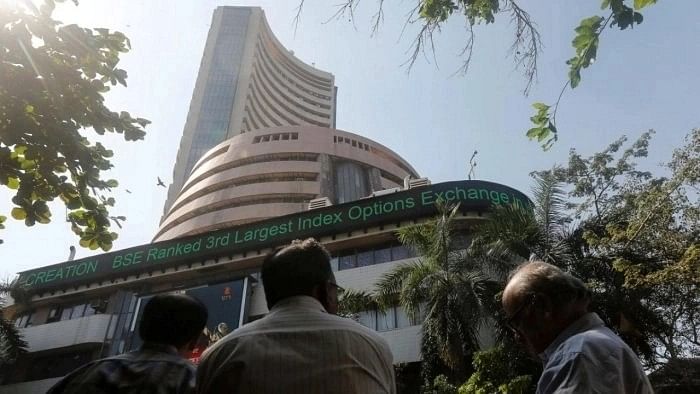
The BSE building.
Credit: Reuters Photo
A day after India surpassed Hong Kong to become the world’s fourth-largest stock market, benchmark bourses Sensex and Nifty ended in red on Tuesday, driven by substantial sell-off in heavyweight sectors - especially banking, escalating tensions in the Middle-East and so far tepid third quarter results of India Inc.
The 30-share BSE Sensex plummeted 1,053.10 points or 1.47% to settle at 70,370.55 while broader Nifty declined 333 points, or 1.54% to 21,238.80.
“It was largely led by HDFC Bank and Zee Entertainment stocks,” founder of WaveWealth Insights Sugandha Sachdeva said. Shares of Zee nosedived 30% on Tuesday following termination of the $10 billion mega merger deal with Sony.
Foreign investors made a net withdrawal of Rs 3,115.39 crore from the Indian capital market on Tuesday, data on NSE showed.
On the Sensex index, IndusInd Bank was the biggest loser with a 5.87% fall, followed by State Bank of India, Hindustan Unilever, HDFC Bank and Bajaj Finance. The S&P BSE Bank Index (Bankex) fell 2.11%, or 1100.70 points.
“Banks were maintaining their margins for a long time but now the direction is that their margins will be under pressure at least for the next two quarters because the cost of funds is increasing and growth from deposit is not coming. So the free cash flow or liquidities they have is coming down,” said Vinod Nair, head of research at Geojit Financial Services.
On the other hand, Sun Pharma, Bharti Airtel, ICICI Bank, Power Grid and Bajaj Finserv bucked the larger trend to emerge as the biggest gainers in descending order.
Barring healthcare, all the sectoral indices ended in the red. The S&P BSE Realty index saw the sharpest plunge at 5.4%. Simultaneously, commodities, energy, metal, oil & gas and services also registered over 3% dip.
“Healthcare has been in a phase of underperforming compared to the midcap and the largecap for some time because of the slowdown in the US economy. The level of price erosion which was happening in the US seems to have stabilised. So the possibility of revenue growth is coming back in the pharma sector,” Nair said.
Questions have emerged over whether Tuesday’s fall could reverse India’s win to bring it back to the fifth position in the world’s top stock markets ranking. While experts who spoke to DH remained on the fence for a near-term scenario, they exuded a positive long term outlook.
“In the last five years, the Hong Kong index, also known as the Hang Seng, has fallen by 45% whereas Nifty rose by 96%. The Hong Kong stock market is heavily dominated by Chinese companies, which have their own set of problems leading to stagnation in the stock returns,” reasoned Shauryam Gupta, chief executive of Rupeezy.